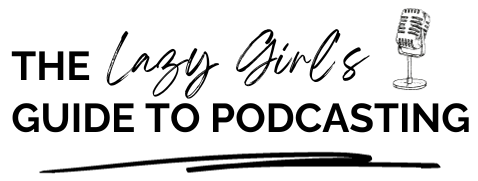This post may contain affiliate links. If you click on an affiliate link and make a purchase, I may earn a small commission at no additional cost to you. For more information, see our Privacy Policy.
A podcast episode is only as good as the show notes that accompany it.
After all, after reading the title, the show notes are usually the first impression that a potential listener may have of your show and/or episode.
Show notes are a written summary of the episode that provides your audience with an overview of what your episode is about.
Good show notes are engaging and encourage your audience to then to listen to your podcast. In this blog post, we’ll discuss how to write stellar podcast show notes that engage your listeners and will keep them coming back for more.
What are Podcast Show Notes?
Podcast show notes are basically a written summary of the content discussed in a podcast episode.
Think of them as being similar to the blurb of a book.
They typically include a brief overview of the episode, key takeaways, quotes, and links to any resources or relevant information mentioned during the podcast.
Show notes are created to help your listeners navigate the episode and provide a reference point for future use.
In addition to being helpful for listeners, well-crafted show notes can also boost a podcast’s search engine optimization (SEO) and make it easier for potential listeners to find and engage with your show.
Do You Need Show Notes for a Podcast?
In a word; yes.
Your podcast’s show notes are prime real estate for potential listeners to find you by searching for keywords associated with your keywords.
Also, if someone is on the fence about listening to your episode, the show notes might mean the difference between a download and a new subscriber, vs losing that listener to another show.
Start with a Catchy Headline
When creating show notes for a podcast episode, it is crucial to start with a catchy headline. As the first thing that listeners will see, the headline needs to be attention-grabbing and engaging. A well-crafted headline should accurately reflect the content of the episode, while also piquing the listener’s interest.
Therefore, it is important to avoid using vague or generic headlines, as they will not entice listeners to click and engage with the episode. But at the same time, you don’t need to spend hours trying to craft the ‘perfect’ title either.
Consider the main topic of your episode and any guests that feature. Use this information to create an episode title that includes this information, whilst being catchy and using the same tone as the rest of your podcast.
I would suggest not naming your episode titles simply after the guest, as this gives little to no insight as to what will be discussed in the episode.
Equally, try not to have your episode title too long. You don’t want it to be cut off on an app or rushed past because it’s too long for someone to skim-read.
By using a headline that is both informative and attention-grabbing, you can increase the likelihood of your episode being discovered and listened to by a wider audience.
Provide a Brief Overview of the Episode
When creating show notes for a podcast episode, it is important to provide a brief overview of the episode in the introduction. This summary might only be a sentence or so long, but it should give your listeners an idea of what to expect and highlight the main points and topics that will be discussed in the episode.
By summarising your episode in one to two sentences, you can help your audience understand the focus and purpose of the episode, and potentially capture their interest in the content. It is important to keep this section concise and engaging, as it serves as a preview of the episode to come.
If you’re using Buzzsprout as your podcast hosting platform, you can add this sentence to the ‘Summary’ section of your episode.
Include Timestamps
Timestamps are a great way to help your listeners navigate your episode. They are essentially a list of topic headings or main conversation points that have been listed out with the time next to them as to when they occur in the episode.
By including timestamps in your show notes, listeners can easily skip to the sections that are most interesting or relevant to them. Timestamps also help listeners follow along with the conversation and stay engaged throughout the episode.
Generating timestamps is easy when you use a tool such as Otter.ai. With this handy tool, you can simply upload your episode audio to get an episode transcript. With this transcript, Otter will pull out what it considers to be relevant points within your episode. You can then use these as a guide to choosing timestamps for your episode.
Don’t Overcomplicate It
When writing show notes, it’s important to use language that’s easy to understand. Why? Because this then makes your show notes as accessible as they can be to as many people as possible.
To write in a way that is easy to understand, avoid using technical jargon or complicated language that might turn off listeners. Instead, use language that’s friendly, approachable, and engaging.
If you’re worried about your level of writing, the Hemingway App grades your writing and tells you how understandable it is to the general population (the lower the writing grade, the more people can easily read it!).
Be Descriptive
Show notes should be descriptive enough to give your listeners a good idea of what to expect from each episode.
Each podcaster is different in how they describe the contents of their episodes. Some podcasters like to go into a lot of depth, almost writing a mini-blog post as their show notes.
Others (like me!) prefer shorter sentences and bullet points. I find that this approach gives my show notes good ‘scanability’ for anyone quickly looking for their next podcast episode to listen to.
Using Bullet Points
When writing podcast show notes, as I’ve already mentioned, using bullet points can be a highly effective strategy.
Bullet points are a great way to make it easy for listeners to quickly scan through the show notes and get an idea of what your episode is about.
By using bullet points to highlight key takeaways, quotes from guests, or any other important information that will be discussed in the episode, you can help your listeners stay engaged and focused throughout the episode.
Additionally, bullet points can make it easier for your audience to remember important information and revisit specific sections of the episode at a later time.
Don’t Forget SEO!
Search engine optimization (SEO) refers to the process of optimising digital content, such as web pages or podcast episode show notes, with the aim of increasing visibility and ranking in search engine results pages (SERPs). Examples of search engines include Google, YouTube, and Bing.
As a podcaster, optimising your show notes for SEO can help you to reach a larger audience and attract more listeners.
By incorporating relevant keywords and phrases into your episode descriptions and titles, you can increase the likelihood of your show appearing in search results when potential listeners search for content related to their niche.
Additionally, well-optimised show notes can make it easier for listeners to find specific episodes and improve the overall user experience of your podcast.
Want more tips on incorporating SEO into your online presence? Check out our podcast episode with SEO guru; Danielle Gagnon:
Conclusion
In conclusion, writing engaging podcast show notes is all about encouraging your audience to listen to your episode and providing them with a preview of what’s to come.
Whilst it can be tempting to put all of your efforts into your podcast recording and then skip over writing top-notch show notes, it’s important to leave time in your schedule to create show notes that are optimised for SEO to allow your show to be as searchable as possible.
What do you think? Did I miss anything? Let me know in the comments!




